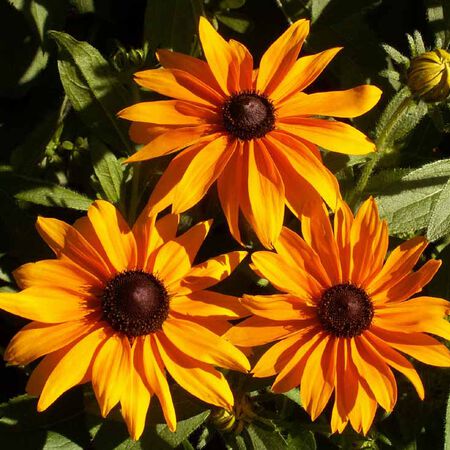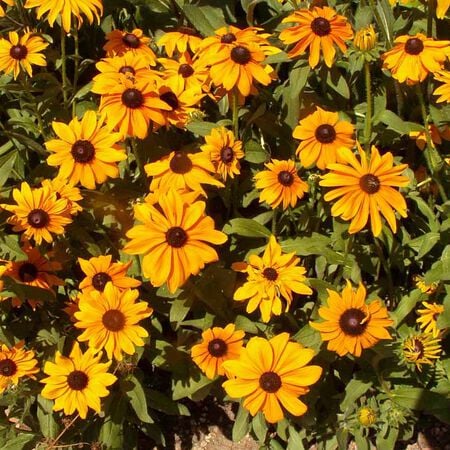Marmalade, Rudbeckia Seeds
Key Attributes
Product Details
Weight
.008Plant Height
2-3'Botanical Name
Rudbeckia hirtaSeed Type
SeedAdditional Characteristics
Attracts Pollinators, Attracts Birds, Extended Blooms, Deer ResistantSeeds Per Gram
2,197Seeds Per Pound
996,000Packet
500 SeedsSow Depth
1/4"Seeds Per Ounce
62,250Breed
Open-pollinatedSun
Full SunUses
Cut FlowersLife Cycle
AnnualSow Method
TransplantCategories
FlowersDays To Maturity (# Days)
115Components
Growing Instructions
![]() Learning Download: How to Grow Rudbeckia
Learning Download: How to Grow Rudbeckia
Rudbeckia are a very popular flower in most gardens. They are heat and drought tolerant and are generally low-maintenance plants. They also attract bees and butterflies to the garden.
Before Planting: Begin Rudbeckia seeds six to eight weeks before the last frost or direct sow them into the garden two weeks before the last frost. Prior to transplanting outdoors, Rudbeckia need to be hardened off. To do so, move the seedlings to a sheltered outdoor place protected from the wind and sun for a week.
Planting: After hardening the Rudbeckia off, space the seedlings 12 inches apart in an area with full sun but be sure to transplant on an overcast day.
Watering: Rudbeckia does require water, especially in hot weather.
Fertilizer: Top dress the plants once they are grown with a well-rotted manure once a year.
Days to Maturity: Rudbeckia blooms summer through fall
Harvesting: Cut the flowers when they are fully open and place them in a vase.
Tips: To grow the best flowers, be sure to weed regularly and deter weeds by spreading mulch around the base of the plant. Mulch will also help to retain moisture.
Shipping Schedule
Our Seed Promise
 "Agriculture and seeds" provide the basis upon which our lives depend. We must protect this foundation as a safe and genetically stable source for future generations. For the benefit of all farmers, gardeners and consumers who want an alternative, we pledge that we do not knowingly buy or sell genetically engineered seeds or plants.
"Agriculture and seeds" provide the basis upon which our lives depend. We must protect this foundation as a safe and genetically stable source for future generations. For the benefit of all farmers, gardeners and consumers who want an alternative, we pledge that we do not knowingly buy or sell genetically engineered seeds or plants.
The mechanical transfer of genetic material outside of natural reproductive methods and between genera, families or kingdoms, poses great biological risks as well as economic, political, and cultural threats. We feel that genetically engineered varieties have been insufficiently tested prior to public release. More research and testing is necessary to further assess the potential risks of genetically engineered seeds. Further, we wish to support agricultural progress that leads to healthier soils, to genetically diverse agricultural ecosystems, and ultimately to healthy people and communities.
To learn more about the "Safe Seed Pledge" please visit www.councilforresponsiblegenetics.org.
Key Attributes
Product Details
Weight
.008Plant Height
2-3'Botanical Name
Rudbeckia hirtaSeed Type
SeedAdditional Characteristics
Attracts Pollinators, Attracts Birds, Extended Blooms, Deer ResistantSeeds Per Gram
2,197Seeds Per Pound
996,000Packet
500 SeedsSow Depth
1/4"Seeds Per Ounce
62,250Breed
Open-pollinatedSun
Full SunUses
Cut FlowersLife Cycle
AnnualSow Method
TransplantCategories
FlowersDays To Maturity (# Days)
115Components
Growing Instructions
![]() Learning Download: How to Grow Rudbeckia
Learning Download: How to Grow Rudbeckia
Rudbeckia are a very popular flower in most gardens. They are heat and drought tolerant and are generally low-maintenance plants. They also attract bees and butterflies to the garden.
Before Planting: Begin Rudbeckia seeds six to eight weeks before the last frost or direct sow them into the garden two weeks before the last frost. Prior to transplanting outdoors, Rudbeckia need to be hardened off. To do so, move the seedlings to a sheltered outdoor place protected from the wind and sun for a week.
Planting: After hardening the Rudbeckia off, space the seedlings 12 inches apart in an area with full sun but be sure to transplant on an overcast day.
Watering: Rudbeckia does require water, especially in hot weather.
Fertilizer: Top dress the plants once they are grown with a well-rotted manure once a year.
Days to Maturity: Rudbeckia blooms summer through fall
Harvesting: Cut the flowers when they are fully open and place them in a vase.
Tips: To grow the best flowers, be sure to weed regularly and deter weeds by spreading mulch around the base of the plant. Mulch will also help to retain moisture.
Shipping Schedule
Our Seed Promise
 "Agriculture and seeds" provide the basis upon which our lives depend. We must protect this foundation as a safe and genetically stable source for future generations. For the benefit of all farmers, gardeners and consumers who want an alternative, we pledge that we do not knowingly buy or sell genetically engineered seeds or plants.
"Agriculture and seeds" provide the basis upon which our lives depend. We must protect this foundation as a safe and genetically stable source for future generations. For the benefit of all farmers, gardeners and consumers who want an alternative, we pledge that we do not knowingly buy or sell genetically engineered seeds or plants.
The mechanical transfer of genetic material outside of natural reproductive methods and between genera, families or kingdoms, poses great biological risks as well as economic, political, and cultural threats. We feel that genetically engineered varieties have been insufficiently tested prior to public release. More research and testing is necessary to further assess the potential risks of genetically engineered seeds. Further, we wish to support agricultural progress that leads to healthier soils, to genetically diverse agricultural ecosystems, and ultimately to healthy people and communities.
To learn more about the "Safe Seed Pledge" please visit www.councilforresponsiblegenetics.org.




